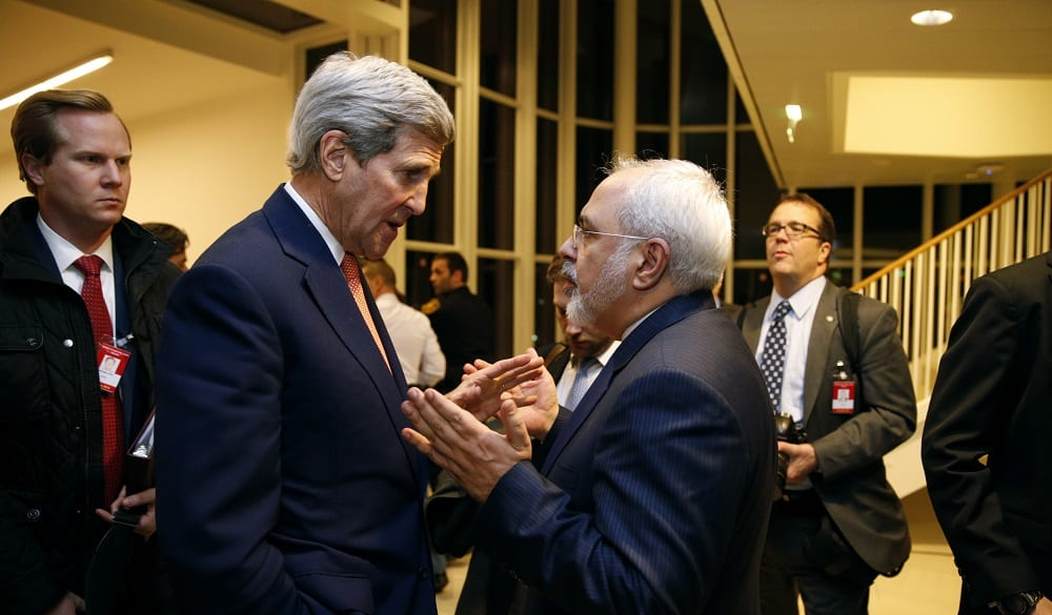President Donald Trump threw out the Iran deal Tuesday and the reaction from the biggest players and the media’s thoughtful left has been a bit, uh, histrionic, to say the least.
https://twitter.com/milanimohsen/status/993889687218655233
The greatest act of self-sabotage in the modern era? That’s quite an infamous accomplishment, particularly because the Iran deal did almost literally nothing for the U.S. It helped Europe by setting up a pathway for energy arrangements with Iran. It helped Russia gain power by playing energy broker between the two. It helped Iran achieve their nuclear ambitions. But the U.S.? We got the pleasure of being blackmailed. It remains a mystery why the Obama administration struck the deal to begin with, but time will likely reveal those motivations.
In the short term, we’ll have to contend with the Obama team’s wringing of hands (former Secretary of State John Kerry’s appeals to Iran to save the deal prior to Trump’s announcement was the first sign of panic). And the former president himself definitely had his say Tuesday after Trump pulled the U.S. out of the deal.
First, the JCPOA was not just an agreement between my Administration and the Iranian government. After years of building an international coalition that could impose crippling sanctions on Iran, we reached the JCPOA together with the United Kingdom, France, Germany, the European Union, Russia, China, and Iran. It is a multilateral arms control deal, unanimously endorsed by a United Nations Security Council Resolution.
Second, the JCPOA has worked in rolling back Iran’s nuclear program. For decades, Iran had steadily advanced its nuclear program, approaching the point where they could rapidly produce enough fissile material to build a bomb. The JCPOA put a lid on that breakout capacity. Since the JCPOA was implemented, Iran has destroyed the core of a reactor that could have produced weapons-grade plutonium; removed two-thirds of its centrifuges (over 13,000) and placed them under international monitoring; and eliminated 97 percent of its stockpile of enriched uranium – the raw materials necessary for a bomb. So by any measure, the JCPOA has imposed strict limitations on Iran’s nuclear program and achieved real results.
Third, the JCPOA does not rely on trust – it is rooted in the most far-reaching inspections and verification regime ever negotiated in an arms control deal. Iran’s nuclear facilities are strictly monitored. International monitors also have access to Iran’s entire nuclear supply chain, so that we can catch them if they cheat. Without the JCPOA, this monitoring and inspections regime would go away.
Fourth, Iran is complying with the JCPOA. That was not simply the view of my Administration. The United States intelligence community has continued to find that Iran is meeting its responsibilities under the deal, and has reported as much to Congress. So have our closest allies, and the international agency responsible for verifying Iranian compliance – the International Atomic Energy Agency (IAEA).
Fifth, the JCPOA does not expire. The prohibition on Iran ever obtaining a nuclear weapon is permanent. Some of the most important and intrusive inspections codified by the JCPOA are permanent. Even as some of the provisions in the JCPOA do become less strict with time, this won’t happen until ten, fifteen, twenty, or twenty-five years into the deal, so there is little reason to put those restrictions at risk today.
Finally, the JCPOA was never intended to solve all of our problems with Iran. We were clear-eyed that Iran engages in destabilizing behavior – including support for terrorism, and threats toward Israel and its neighbors. But that’s precisely why it was so important that we prevent Iran from obtaining a nuclear weapon. Every aspect of Iranian behavior that is troubling is far more dangerous if their nuclear program is unconstrained. Our ability to confront Iran’s destabilizing behavior – and to sustain a unity of purpose with our allies – is strengthened with the JCPOA, and weakened without it.
Well with that kind of praise for himself, it sounds like Amanpour must certainly be right: how could we shoot ourselves in the foot so dramatically? TRUMP WHAT HAVE YOU DONE?
Let Commentary Magazine reporter Noah Rothman ease your minds, people wanting to be hopeful about the future. Here’s a twitter thread he created Wednesday morning with just a smattering of mainstream press stories over the past several years about exactly how problematic the deal was; primarily because Iran was being, really, really, shifty (Israeli Prime Minister Benjamin Netanyahu now says he has proof of their subterfuge).
https://twitter.com/NoahCRothman/status/993910274452283392
https://twitter.com/NoahCRothman/status/993910330182062080
https://twitter.com/NoahCRothman/status/993910500131065856
https://twitter.com/NoahCRothman/status/993910581404069889
https://twitter.com/NoahCRothman/status/993910696739041335
https://twitter.com/NoahCRothman/status/993910963584819201
https://twitter.com/NoahCRothman/status/993911165993607168
https://twitter.com/NoahCRothman/status/993911387897376768
https://twitter.com/NoahCRothman/status/993911507519000577
https://twitter.com/NoahCRothman/status/993911612674396161
Back to work, indeed.














Join the conversation as a VIP Member